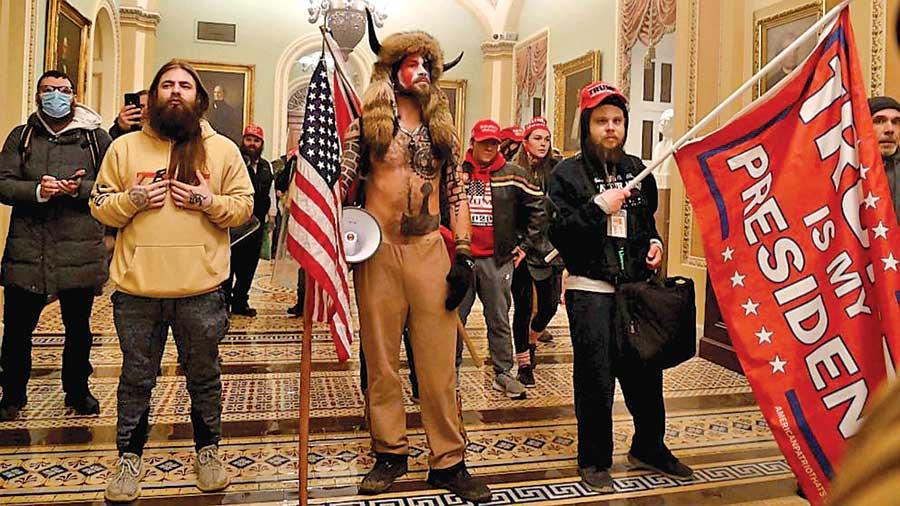11 Jan 2021 - {{hitsCtrl.values.hits}}

"No one in the world is likely to see, respect, fear, or depend on us in the same way,” said Richard Haas, the President of the Council on Foreign Relations, a US-based think-tank, in a tweet"
This was unbelievable, like scenes from another disaster movie from Hollywood -- Pro-Trump supporters storming the Capitol, Washington DC, the sacred political Golden Temple of the United States. By the time it was over, the tallying of electoral votes to confirmed President-elect Joe Biden’s victory was forced to a halt, Vice President Mike Pence, Speaker of the House of Representatives and others ushered to safety, and five people including a Policeman were dead.
the Capitol, Washington DC, the sacred political Golden Temple of the United States. By the time it was over, the tallying of electoral votes to confirmed President-elect Joe Biden’s victory was forced to a halt, Vice President Mike Pence, Speaker of the House of Representatives and others ushered to safety, and five people including a Policeman were dead.
Gone, too, was the reputation of the United States of America as the most secure bastion of democracy in the world.
The storming and siege, described by analysts as an insurrection and even a coup attempt, came after President Donald Trump urged his hard-line supporters to march on the Capitol and ‘correct’ his November election defeat.
Political scientists pointed out that the day’s events would change the way the world views the US.
“No one in the world is likely to see, respect, fear, or depend on us in the same way,” said Richard Haas, the President of the Council on Foreign Relations, a US-based think-tank, in a Tweet.
Ian Bremmer, the President of Eurasia Group, said on Twitter:
“It is unimaginable that today’s political disaster could happen in Canada, Japan, France or the UK,” saying that the US “is the most politically dysfunctional and divided of advanced industrial democracies”.
Or in India, Nigeria, Colombia or Sri Lanka, for that matter.
For their angry, warlike rhetoric, the Rajapaksa clan went home peacefully after losing power ignominiously in 2015.
Former President George W. Bush condemned what he called “insurrection” in a statement:
“This is how election results are disputed in a banana republic – not our democratic republic. I am appalled by the reckless behavior of some political leaders since the election and by the lack of respect shown today for our institutions, our traditions, and our law enforcement.”
The situation was so bad that Washington DC Mayor Muriel Bowser activated the National Guard and issued a citywide curfew from 6 p.m. on Wednesday January 06 until 6 a.m Thursday.
The neighbouring State of Virginia dispatched members of the Virginia National Guard and 200 state troopers.
It was not until early evening, almost four hours after the occupation that officials declared the Capitol “secure”. The certification of Electoral College votes resumed later Wednesday night.
"If they think their party can’t gain power electorally, there’s nothing to stop these fanatics from turning to terrorism, the way radical black Americans such as the Black Panthers did in the 1960s"
The Capitol Hill Police were outnumbered and overwhelmed, and the National Guard and Federal agents, who worked so hard to crush the BlackLivesMatter protests (BLM) were not to be seen until late in the evening.
Observers were quick to point to glaring disparities between the way Trump’s supporters, who are white, were confronted and those involved in the BlackLivesMatter movement were treated.
During the mayhem, Police used teargas in a desperate attempt to control the crowd. A Senate aide fortunately remembered to take the electoral-college documents with him as he evacuated the chamber.
“We will never give up,” Trump had told his supporters earlier in the day in a speech which bore the trademark of his conspiracy theories.
“We will never concede. It doesn’t happen. You don’t concede when there’s theft involved.”
He told them to march from the Capitol to “Save our Democracy”. He even said he would go with them, but it was just another promise he had no intention of keeping. Instead, his travelled by limousine the hundred yards back to the White House.
Always adept at lying, Trump was careful to tell his volatile supporters to go to Congress “peacefully and patriotically”. But they already had a different idea. Just a few minutes later, the barricades outside the Capitol were down and the mob was charging. They had been told repeatedly that their nation was at stake, that child-trafficking, pro-Chinese socialists were taking over, and they had to fight harder to save the country and “make America great again.”
Typically, Trump did an about turn after the mayhem and condemned the violence.
Now that the attempted coup has been thwarted and there’s nothing to stop Joe Biden from assuming the presidency, just where is the United States of America going in the post-Trump era?
There are two possible scenarios.
One is that hardline but smarter-than-Trump Republicans such as Ted Cruz will gain ground and will turn the US into the ‘banana republic’ that George W. Bush seems to dread so much.
The Republican Party has already been compared to authoritarian rightwing political parties in countries such as Poland, Turkey and Hungary. The great danger is that many ultra-right Republican supporters are armed and believe that only violence can curb those left-wing conspiracies which prevent America from being great again.
Police said pipe bombs were discovered outside the offices of the National Committees of both parties. They also found a cooler with a long gun and Molotov cocktails in a vehicle on the Capitol grounds. Trump had told his supporters that those Republicans such as his former deputy Mike Pence who fail to overturn the election were ‘weak’ and ‘pathetic.’
If they think their party can’t gain power electorally, there’s nothing to stop these fanatics from turning to terrorism, the way radical black Americans such as the Black Panthers did in the 1960s.
Trump has again and again exhorted his supporters to attack Democratic politicians. There’s nothing to stop these fanatics from assassinating rising stars in the Democratic Party with the potential to win the presidency. The US has a long and sobering history of its most charismatic political leaders killed in their prime, from Robert Kennedy to Martin Luther King Jr.
But, in a country where so many people are armed (more Americans die now in shootings than in road accidents), the opposite side can’t be expected to sit and turn the other cheek. There could be guerrilla warfare, terrorism and counter-terrorism degenerating into a near civil war.
Looking at the bright side, however, there is hope for American democracy and its peaceful political traditions in the new generation of political activists who work quietly and hard to educate people in the value of democracy and equal rights for all. There are many African Americans in their ranks.
The startling Democratic Party win in Georgia, a longtime Republican bastion and the final nail in the Republican Party’s election coffin, did not happen overnight. Groups of activists have been working at grass roots levels long before Donald Trump came into power to change people’s minds, and they have clearly succeeded.
After Joe Biden beat Trump by more than 12,000 votes in Georgia, the outside world learned about activists such as gubernatorial candidate Stacey Abrams who worked tirelessly to mobilise voters to fight voter suppression. But she wasn’t alone. Groups such as The Georgia Coalition for the People’s Agenda, Clayton County’s Black Women’s Roundtable and Transformative Justice Coalition worked behind the scenes day and night to make the transformation possible (in Sri Lanka, there is a glaring lack of such people’s groups engaged in educating voters about the value of democracy).
The Rev Raphael Warnock, who defeated Republican Senator Kelly Loeffler, made history as the first Black senator from Georgia, a state shaped by the legacy of the civil war and the civil rights movement. Jon Ossoff who defeated the Republican incumbent David Perdue would become the youngest member of the Senate at 33. The resulting 50/50 party split in the Senate would give the incoming vice-president, Kamala Harris, the tie-breaker vote and make Democrat Chuck Schumer majority leader.
That would give Democrats an unlikely clean sweep of the White House, Senate and House of Representatives and help Joe Biden implement what could be the most progressive legislative agenda in generations, from raising taxes and enacting a sweeping climate plan, Biden will need Senate approval. Senate committees will be chaired by Democrats, not Republicans.
It won’t be a cakewalk, but this is a much better scenario than what we had pre-November, when many wondered if the Democrats could win at all. What Biden can and should do, with Kamala Harris as his vice president (of mixed Jamaican-Indian parentage), is to try and convince the rest of the world that America is a sane country that can be trusted again.
30 Nov 2024 1 hours ago
30 Nov 2024 2 hours ago
29 Nov 2024 29 Nov 2024
29 Nov 2024 29 Nov 2024
29 Nov 2024 29 Nov 2024